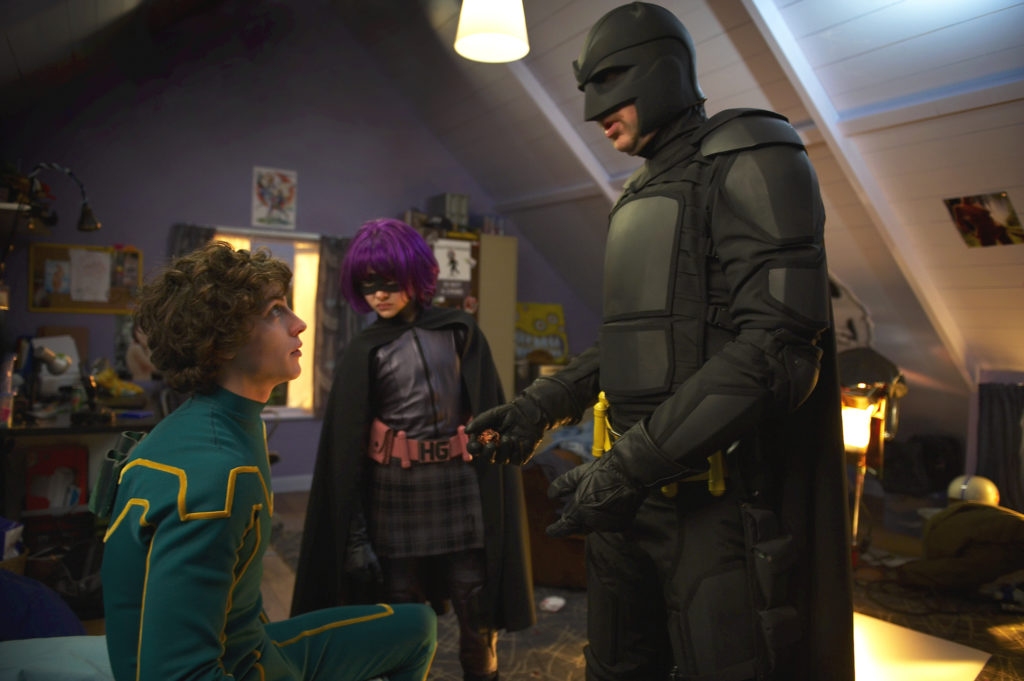Open up a can
Kick-Ass isn’t really one movie. It’s three mini-movies directed by Matthew Vaughn, adapted from a Mark Millar Marvel comic written at the same time as the film, heterogeneously blended together and composed of wildly different tones, making the film a bit of storytelling whiplash from scene to scene until the brazenly violent ending that ties them together.
Let’s go in ascending order of goodness: The weakest part of the film is a mini crime story about a son (gently coded as gay, or at least lacking in traditional masculine toughness) trying to find his place in his father’s struggling crime empire. Chris D’Amico (Christopher Mintz-Plasse) is a rich brat with no friends, and can only participate in his father Frank’s (Mark Strong) scheming by pressing his ear up against closed doors.
Many of these scenes are glossier, limper versions of what Vaughn was doing in Layer Cake. Strong is always a badass, but Frank D’Amico is such a forgettable villain that these segments generate no menace or intrigue. Mintz-Plasse, while I will forever cherish him for giving us McLovin, conveys absolutely no pathos or complexity that the conflicted son of a mob boss requires.

The next of these stories is a knockoff Spider-Man origin with some bonus sex comedy DNA cooked in. Dave Lizewski (Aaron Taylor-Johnson) declares himself Kick-Ass after he decides he wants to become a masked vigilante like his favorite superheroes. His early attempts to take down bullies and petty criminals inadvertently interfere with the D’Amico crime syndicate and makes him a target of retribution.
Vaughn contradicts himself multiple times over: The opening proclaims this is the gritty story of what a superhero would look like in real life, with a normal human under mask. And yet Kick-Ass does get a power of sorts when a nerve injury gives him an unusually large pain tolerance. And there’s no grittiness in sight: this is a slick and goofy story, a teen comedy bent into superhero shape, almost but not quite hitting on some metaphorical content on the vicious expectations and trials of entering adulthood.
The sex comedy part of this is the broadest material of the whole film: Dave pines after the beautiful and popular Katie (Lyndsy Fonseca). After a rumor spreads that Dave prefers the company of gentlemen, Katie adopts him as her gay best friend, which finally gives him a lot of alone time with his crush but leaves him with constant blue balls. It’s a story that would have made a decent teen romcom ten or fifteen years earlier, but by 2010 was pretty obviously misguided. Luckily, Vaughn wraps up the farce before it becomes too much of a problem, giving Dave a real girlfriend as stakes for the finale.

The best part of Kick-Ass, the thread that is legitimately great and funny and touching, is the story of Hit-Girl and Big Daddy, a father-daughter duo of ruthless masked heroes played by Nic Cage and Chloe Grace Moretz. The satirical thrust of the story, lampshading the fascism and arbitrary cruelty of vigilante justice, is rich and clever. Cage gives a wonderfully dry and kooky performance of a man so overcome with his demons that it breaks down his ability for anything other than fatherhood and vengeance. It’s a lovingly poisoned Adam West pastiche. Moretz is his perfect counterpart, toggling between sweet innocence and terrifying violence with ease. It’s conveying the same approximate message that Watchmen did with Rorschach decades earlier. But in the age of superhero saturation, the point still feels fresh, especially with the amusing and borderline poignant juxtaposition with the warm bond between father and daughter.
Vaughn can’t quite salvage the project into a coherent whole, but it is certainly a fascinating and memorable misfire. Vaughn’s direction is not without merit — he pulls just the right touches from the Wachowskis and Zack Snyder circa-300 for some frothy, stylized ultra-violence in the climax in particular. (Having it pre-storyboarded in comic form probably helped, too.) As a director, he might not know quite what story he wants to tell, but through three films I can tell why Hollywood keeps giving him money: The end result is a slick, professional final-product that has enough story hooks and energy to be easily marketed to a wide audience. This template doesn’t necessarily make for a good movie, but Kick-Ass has enough charm in the right moments to at least keep me interested for the runtime, which is more than be said for plenty of circa-2010 blockbusters.
- Review Series: Matthew Vaughn
Is It Good?
Nearly Good (4/8)
Awards, Honors, & Rankings
Dan is the founder and head critic of The Goods. Follow Dan on Letterboxd. Join the Discord for updates and discussion.


2 replies on “Kick-Ass (2010)”
However you feel about Kick-Ass, I think we can all agree that it looks good in comparison to Kick-Ass 2.
I have never seen it, and have seen no indications that I ought. We’ll see if my completionism compels me.